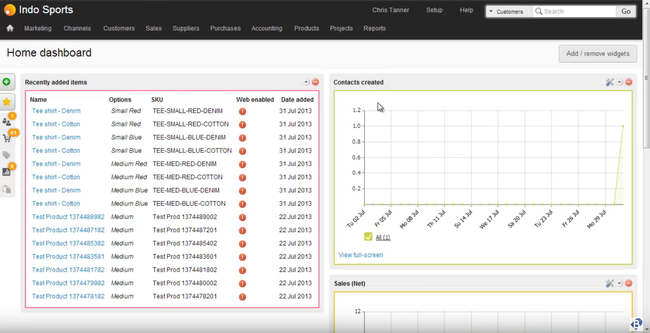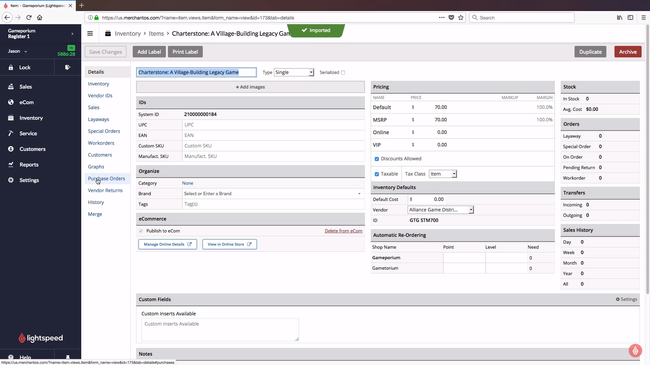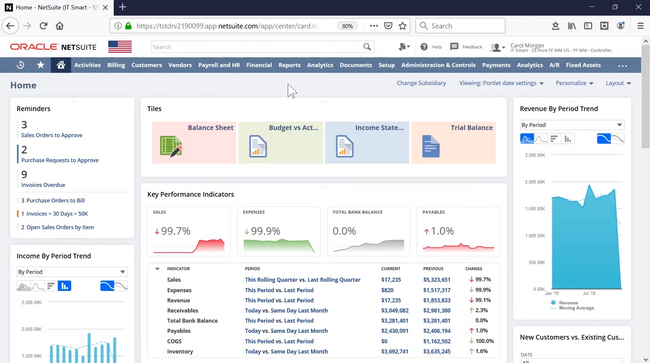ERP software for the retail industry provides optimal inventory tracking, reducing waste and enhancing customer experiences. Cloud-based ERP systems are now more affordable, adaptable, and scalable for small to midsize retailers, eliminating the need for major system revamps. Crucially, a top-notch retail ERP connects with eCommerce platforms, shipping apps, and accounting tools, offering a unified view from sales to shipments. When choosing an ERP, check for popular integrations like Shopify, WooCommerce, QuickBooks, and ShipStation.
- Brightpearl: Best Overall
- Lightspeed Retail: Advanced Product Management
- NetSuite: Extensive Integrations
- Dynamics 365: Top Multi-Company Support
- Acumatica: Great Omnichannel Management
- Odoo: Best for Online Retailers
- SAP Business One: Advanced Inventory Control
- Epicor Retail: Great for Multichannel Businesses
- Sage Intacct: Best Financial Management
- Multiview: Streamlined Order Fulfillment
1 Brightpearl - Best Overall
Why We Chose It: Brightpearl is a vendor management system that can act as an ERP. It’s in our top ten for its real-time accounting, integrated POS system, and multi-channel support. Unlike many ERP systems that require manual syncing or batch processing, Brightpearl offers live financial tracking. This means data is automatically updated in real-time as transactions occur.
Brightpearl’s integrated POS system allows retailers to manage both their online and brick-and-mortar stores from a single platform. This is particularly beneficial for omnichannel retailers. Finally, it supports transactions in multiple currencies and integrates with multiple sales channels, making it a suitable choice for international retailers.
2 Lightspeed Retail - Advanced Product Management
Why We Chose It: While technically a point-of-sale software, Lightspeed Retail is an effective ERP for growing retailers. It’s our best overall pick because of its advanced product matrix tool. This feature allows retailers to create, track, and manage product variants with ease – whether it’s size, color, or any other variant. For businesses expanding their product range, this eliminates the headache of managing countless SKUs manually.
However, it’s essential to note some challenges. Some users have highlighted issues with delayed support and unexpected fee hikes. While these are areas of concern, the overarching capabilities of Lightspeed Retail, especially its seamless omnichannel integrations, make it a formidable tool for retailers on an upward trajectory.
3 NetSuite - Extensive Integrations
Why We Chose It: NetSuite is our top pick for extensive integrations because it integrates with eCommerce software, point-of-sale apps, and other third-party tools to give retailers a holistic view of their entire operation. For a retail business, which might have both online and brick-and-mortar operations, this unified view can improve efficiency, reduce errors, and enhance the customer experience.
NetSuite’s mature, cloud-native design ensures that companies can access their ERP data and tools from anywhere. It offers a comprehensive feature set, spanning financials, CRM, eCommerce, and inventory. For retailers, combining complete accounting tools with effective supply chain management can be crucial. Properly managing inventory and finances ensures that retailers can make accurate purchasing decisions, forecast demand, and manage their cash flow efficiently.
4 Dynamics 365 - Top Multi-Company Support
Why We Chose It: We found Microsoft Dynamics 365 Business Central a solid choice for retailers operating internationally. Its multi-currency and multi-language support ensures seamless transactions across different regions. With these capabilities, businesses can ensure accurate financial reporting and cater to a diverse clientele without encountering language barriers.
Business Central is integrated with various Microsoft applications, such as Office 365, Power BI, and Azure. This allows multi-company retailers to maintain a consistent workflow across multiple branches or departments. For instance, quotes, orders, and invoices can be created directly in Outlook, enhancing efficiency. Moreover, the familiar interface, similar to MS Word and Outlook, ensures that employees across different locations can quickly adapt to the platform without extensive training.
5 Acumatica - Great Omnichannel Management
Why We Chose It: We think Acumatica is best for omnichannel management because it ensures real-time updates across multiple channels. This delivers information like inventory levels, order statuses, and customer data is consistent regardless of the channel being used. With Acumatica, retailers can connect their storefront and back office, enhancing the omnichannel shopping experience for customers and ensuring seamless operations for the business.
Acumatica Retail Edition is designed explicitly for omnichannel sales organizations. It provides native connectivity to numerous sales channels, including commerce sites, marketplaces, in-store POS devices, and other channels. Whether a customer is shopping online from a desktop or mobile device, or in a brick-and-mortar store, Acumatica ensures that there’s cohesion in terms of product availability, pricing, and customer service.
6 Odoo - Best for Online Retailers
Why We Chose It: Odoo provides a seamless eCommerce integration, allowing retailers to set up an online store effortlessly. The AI website configurator aids retailers in designing their sites, and they can also select from a range of pre-made industry-specific themes. Furthermore, Odoo equips retailers with tools to enhance their online conversion rates. This includes the integrated tracking tool and the ability to connect to Google Analytics. By understanding visitor behavior, retailers can make informed decisions to increase conversions.
Odoo is a genuine omnichannel platform that connects an online store and other sales channels, such as point-of-sale (POS) or Customer Relationship Management (CRM) systems. This unified system ensures that all sales data, whether online or offline, flows into a central repository.
7 SAP Business One - Advanced Inventory Control
Why We Chose It: We found SAP Business One a great pick for retailers because it incorporates a streamlined approach to tracking and tracing items through its batch and serial number management. This is indispensable for efficient product recalls or executing quality assurance checks. Another feature that elevates its value proposition is bin location management. By pinpointing the exact storage locations of items within a warehouse, it not only speeds up the picking process but also simplifies the restocking endeavor.
SAP Business One also offers traceability tools. Retailers gain a clear vantage point from the procurement phase to the point-of-sale. Advanced shipping and receiving tracking enables retailers to keep an eagle eye on expected arrival or dispatch timelines. Furthermore, the depth of its warehouse tracking is not limited to mere quantity checks; it drills down to the very shelf or bin location of an item.
8 Epicor Retail - Great for Multichannel Businesses
Why We Chose It: We think Epicor Retail is good for multichannel businesses because it has a unified point-of-sale system, harmonizing the in-store and online checkout experiences. With features such as ‘buy online, pick up in-store’ (BOPIS) and ‘buy online, return in-store’ (BORIS), it creates a fluid shopping journey, blurring the lines between physical and digital realms.
Additionally, Epicor Retail’s CRM tool is crafted to curate a personalized shopping experience. This system captures, analyzes, and segments customer data from all channels, enabling businesses to deliver targeted marketing campaigns and tailored product recommendations.
9 Sage Intacct - Best Financial Management
Why We Chose It: Sage Intacct is our top pick for financial management because it offers a multidimensional general ledger that empowers retailers with real-time financial and operational insights. Instead of just tracking basic financial data, retailers can gain actionable insights by drilling down into financial performance by store location, product line, or even sales channel.
One of Sage Intacct’s standout features is its automated revenue recognition. As the retail landscape shifts towards subscription models and bundled services, Sage Intacct helps retailers automate and streamline the revenue recognition process, ensuring compliance with evolving accounting standards.
Another noteworthy aspect is its advanced expense management. Retailers can directly connect their bank accounts and credit cards to Sage Intacct. This ensures real-time transaction updates, which further simplifies the reconciliation process and offers immediate insights into cash flow.
10 Multiview - Streamlined Order Fulfillment
Why We Chose It: We think Multiview is great for optimized order fulfillment due to its immediate insight into order tracking. This is instrumental in pinpointing potential hiccups or bottlenecks in the order fulfillment process. With real-time data, retailers can take swift action to ensure that orders are processed efficiently and delivered within the promised timeframe.
Additionally, Multiview has a streamlined picking and packing process. Its features make the picking of items from the warehouse more efficient through various strategies. Additionally, it aids in optimizing the packing of goods, which can lead to reduced shipping costs and more efficient transportation of orders. This not only means cost savings for the retailer but also potentially faster delivery times for the customer.
Methodology to Choose the Best Retail ERP
Key Features
The first criterion we consider is the core features of retail ERP. Here are the key functionalities we think every product should have:
- CRM: Ability to manage customer relationships, maintain buyer history, and personalize customer experiences.
- Supplier Management: Efficient tools for managing supplier relationships, streamlining negotiations, and overseeing contract terms.
- Procurement: Streamlined purchase order generation, approval workflows, and order tracking.
- Inventory Tracking: Real-time tracking of stock across multiple warehouses or store locations, with stock movement histories.
- Supply Chain Management: Coordination of product flow, from suppliers to end-consumers, and managing disruptions efficiently.
- Forecasting: Tools that use historical data and current market trends to predict future sales, stock requirements, and customer behavior.
- Accounting: Comprehensive financial management tools specific to retail needs, such as sales tracking, revenue recognition, and cost management.
- Business Intelligence: Advanced analytics tools for deriving insights from sales, inventory, and customer data to drive business strategy.
Pricing
We then weigh products based on their financial flexibility:
- Scalability: Does the pricing model allow for growth, especially during peak seasons like holidays, without excessive costs?
- Feature Tiers: Are essential features available in the basic tier, or are they hidden behind a higher price point?
- Transaction Fees: For retailers with a significant sales volume, does the ERP system charge transaction fees, and if so, how do these stack up?
Integrations
To round off our methodology, we prioritize retail ERP that integrates seamlessly with:
- eCommerce Software: Integration with popular eCommerce platforms like Shopify, Magento, or WooCommerce ensures seamless online sales management.
- Point-of-Sale (POS) Systems: For brick-and-mortar retailers, integration with their POS systems is essential for real-time sales data synchronization.
- Payment Gateways: Compatibility with various payment processors like Stripe, PayPal, or Square is crucial for diversified payment options.
- Marketing Tools: Integration with email marketing tools like Mailchimp or CRM platforms for targeted campaigns.
- Third-party Logistics (3PL) Software: Integration with logistics providers for efficient order fulfillment.
- Accounting Software: Seamless data flow between the ERP and accounting tools like QuickBooks or Xero.
What Is a Retail ERP System?
A retail ERP system is a specialized software crafted to support retailers in overseeing various facets of their business. This encompasses financial oversight, supply chain coordination, sales strategies, customer relationships, and inventory control. Tailored specifically for the retail industry, these systems ensure functionalities align perfectly with the nuances of retail operations.
What Is ERP Used For in Retail?
Retail ERP software seamlessly consolidates various software applications a business uses into a singular suite. Specifically crafted for the retail industry, it facilitates efficient business operations management and ensures a steady flow of information.
Key features of retail ERP systems include:
- Point-of-Sale (POS) Systems: Directly interfaces with customers during sales.
- Customer Relationship Management (CRM) Software: Manages interactions with customers and potential customers.
- Inventory Management: Keeps track of stock and inventory levels.
- Financial Management: Manages business finances, including sales, expenses, and profits.
- Supply Chain Management: Oversees product flow from suppliers to customers.
- Sales Management: Plans and directs the distribution of products.
- Channel Integration: Ensures coordination between different sales platforms.
- Rewards and Loyalty Management Programs: Engages and retains customers.
- Product Management: Oversees product assortment, pricing, and promotions.
- Warehouse Management Software: Manages storage, dispatch, and receipt of goods.
How Much Does Retail ERP Cost?
The monthly subscription cost for retail ERP systems typically ranges from $1,700 to $10,000 for small to midsize retailers. It’s a common industry guideline to allocate approximately 3% of annual sales for retail ERP software expenses.
Retail ERP pricing is influenced by various factors including:
- Number of Active Users: The number of employees accessing the system.
- Total Employees: The overall workforce size that the ERP needs to cater to.
- Deployment Model: Costs can vary based on whether the system is on-premise or cloud-based.
Beyond the subscription costs, retailers should account for implementation expenses. These initial costs can significantly boost the total cost of ownership (TCO) in the software’s first year. A general rule of thumb for estimating implementation fees is to anticipate an amount equivalent to twice the annual software usage cost.
What Are the Benefits of ERP Systems in the Retail Industry?
ERP systems offer retailers a multitude of advantages:
- Real-time Visibility: Retailers can access live data on inventory, sales, and customer behavior, allowing for strategic decisions on stock levels, reordering, and pricing.
- Inventory Management: ERP tools enhance inventory oversight, ensuring efficient operations and fewer order discrepancies or supply hold-ups. Everything is tracked from start to finish, reducing wastage of resources and ensuring smooth operations.
- Customer Service: ERPs store customers’ purchase histories, enabling personalized shopping experiences, thus elevating customer satisfaction.
- Supply Chain Operations: Retail ERP systems optimize supply chain processes, assess individual store performances, and enhance the overall customer journey.
- Efficiency: By eliminating redundant tasks, ERPs streamline workflows, enabling employees to be more productive and driving revenue growth.
- Decision-making: Through comprehensive reporting, analytics, and dashboards, ERP systems equip retailers with insights for informed decisions, from pricing strategies to product offerings.
In essence, ERPs are pivotal for modern retailers, bolstering inventory handling, operational efficiency, and customer engagement. They are instrumental in maintaining a competitive edge in a dynamic retail landscape.
What Is the Best ERP for Small Retail Businesses?
For small retail businesses, numerous ERP software options stand out based on specific strengths:
- Microsoft Dynamics 365 Business Central: Top Overall Choice
- SAP Business One Professional: Ideal for Complex Inventories
- SYSPRO: Optimal for Cost Management
- QT9: Best for Backend Operations
- Epicor Prophet 21 ERP: Top Choice for Custom Solutions
- Oracle NetSuite OneWorld: Perfect for Omnichannel Sales
- Acumatica: Superior for Integrations
However, the ideal ERP for any retail business is influenced by size, growth trajectory, and operational structure. Thus, it’s crucial to assess multiple ERP vendors. Some leading names in the retail ERP domain include SAP, Microsoft, Netsuite, and Infor.
















































